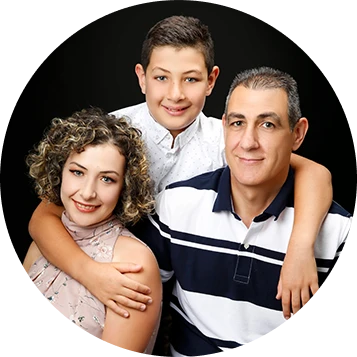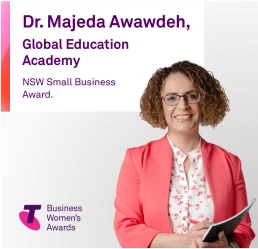Our Research-based Textbooks
Based on her PhD research into Cognitive Load Theory (CLT) at UNSW and Realistic Mathematics Education (RME) at Haifa University, our founder Dr Majeda Awawdeh, discovered that mathematics can be taught in a simpler and better way when the textbooks and the instructional material are designed based on these two theories.
RME builds deep, long-term conceptual understanding by starting from contexts that are familiar to the learners. CLT ensures that the material is written with the structure of the brain in mind and is rooted in our current understanding of human cognitive architecture. The two theories work together to maximise conceptual understanding and optimise learning.
Dr Majeda also found that it is not limited to mathematics, but it can be applied to teaching English as well. If students learn the two core subjects effectively, she believes that they can master all other subjects because they are learning how to learn.
But the difficulty was in getting the teachers to apply these theories and teach in this way. She developed the GEA curriculum and teaching methodology based on the two theories and conducts regular teacher training. Our unique curriculum is not only mapped to the Australian curriculum, but it takes it a notch further.
In 2011, our founder put the theories into practice; She developed the whole curriculum of maths and English from kindergarten to Year 10 and started Global Education Academy. The textbooks are foundational to this.
The Structure of the Books
Each student receives 4 books for English and 4 books for mathematics every year. One book for each subject per school term.
Each book incorporates a diagnostics assessment that takes place towards the end of each school term. The assessment is an Assessment for Learning where students complete the assessment while simultaneously learning from it. Feedback is provided immediately by their teachers. Parents receive a report that numerically demonstrates students’ level of mastery in individualised areas. Based on the assessment, students can move vertically through the levels without a ceiling imposed by their age or grade at school.
While designed based on the two theories researched, the scope and sequence of the books allows for vertical and horizontal movement of students as they progress and advance throughout the year and from year to year.
The textbooks include minimal homework to consolidate what students learn in the lesson.
The English Curriculum
Our English books integrate all the components of the English language: Reading (fluency and accuracy), Reading Comprehension, Spelling (both visual and auditory), Grammar, Syntax, Punctuation and Writing (all genres). Writing includes all the stages from planning to writing to editing, which results in the ability to produce effective meaningful essays and creative writing pieces.
The books are linked vertically so students can move up during the school year without interruptions to their learning. Each unit in the book has a quiz to stimulate students learning and revision of previous units. It also boosts their confidence in a tangible way. The reading comprehension texts are linked with the writing genre of each unit, hence they are used as samples for students.
In addition, students are given writing booklets so they can submit their writing for marking and feedback while keeping their textbooks with them to share with their parents.
The books are designed to be comprehensive, simple to follow and aligned with the structure of learners’ brain while ticking the objectives of the curriculum.
The Maths Curriculum
Familiarity with the context is a significant part of the design of our maths books. We know that familiarity with the context is one of the measures that can be taken to reduce the extraneous ‘cognitive load’. Cognitive load is the burden experienced by learners when learning novel material or new content. There are other measures that are considered and used in our textbooks to reduce cognitive load to optimise learning.
Each unit in the maths books starts with the dot points to be addressed in the unit. Many parents find the terminology table at the start of the unit helpful and interesting. We believe that all parents, not just students, should be familiar with the terminology used in maths at schools. This is particularly useful for parents who were educated overseas, however mathematics is constantly evolving and it is not uncommon for parents to be out of practice with specific terminology and strategies.
In our maths books we focus on conceptual understanding by teaching the concepts first and explaining how we use it in real life. Once it is grasped as a concept, we move to explaining the strategies related to this concept. We do not solely focus on formulas as we know that when students understand concepts, they can easily recall and, most importantly, build the skill to generate formulas through their own accord.
The mathematical concepts in the books are demonstrated and taught integrating hands-on activities designed around real-world context which stimulates different parts of the brain.
A significant component of our maths books is problem-solving. We have developed a unique problem-solving strategy; the UPSLTM Strategy. It is a four-stage strategy: Understand, Plan, Solve and Learn. This strategy empowers students with a life-long problem-solving approach that can be used in all fields (not just in our maths textbooks).
When students learn how to solve problems, new wiring is developed in their brain and these neuron pathways are strengthened through continued and regular practice. This will help them in problem-solving in the real world. It is a very important and useful skill to have!
Each maths textbook is accompanied with a drill booklet for the warmup multiplication drills – a 2-minute pop quiz at the beginning of each lesson to help students memorise their timetables skills.
All of our books have termly assessments integrated and numerical reports for parents. Based on the assessments, students can be progressed to the next level – although this is not the main goal; understanding is our focus.
The Selective and Scholarship Textbooks
Our selective course textbooks are developed based on Cognitive Load Theory and mapped to the Cambridge framework for the selective test. There are 8 textbooks in the entire course and 15 mock exams made up of 60 components.
There are four books (Book 1 to Book 4) to teach maths, problem-solving and thinking skills (deductive reasoning).
There are four books (Book 1 to Book 4) to teach reading comprehension, writing and thinking skills (inductive reasoning and critical thinking).
Each unit in each book starts with a quiz to track students’ progress and mastery of previous units.
The textbooks have the theory, examples and similar questions to the Cambridge practice questions.
The mock exams provide a great insight on students’ performance under exam conditions and highlight any gaps in their learning. All mock exams are discussed in class with the teachers and comprehensive feedback is provided to students. Furthermore, mock exam marks are freely available online for parents to access and review.
The Opportunity Class (OC) Textbooks
Our OC course textbooks are developed based on Cognitive Load Theory and mapped to the Cambridge framework for the selective test. There are 6 textbooks in the course and 5 mock exams made up of 15 components.
There are three books (Book 1 to Book 3) to teach maths, problem solving and thinking skills (deductive reasoning).
There are three books (Book 1 to Book 3) to teach reading comprehension, vocabulary and thinking skills (inductive reasoning and critical thinking).
The textbooks have the theory, examples and also full solutions to the Cambridge practice tests and similar questions.
Some Testimonials About Our Textbooks:
Student
- We learn in 2 hours here (at GEA) more than what we learn at school in a whole week.
- It is so much easier than school. I understand maths.
Parents
- During Covid lock down, GEA’s books is what kept my child learning. We knew we had it covered because our child covers all the maths and the English he needs when schools were closed.
- The books are so great and comprehensive. I work in the private education overseas – can I please take these books to market them to schools there. They would love them
- These books are easy to grasp and understand. I now know what my child needs to know as I don’t have textbooks from school.
- I finally have an assessment, so I know exactly how my child is doing, unlike school when they keep telling me vague things. And I also can see the assessment and the mistakes she made. I can help her now.
- I am grateful to have these books for my child. I can help them with maths, but I did not know what strategies to use and what they call things here in Australia. It is different to what I learned overseas.
- My child is homeschooled. Thank you for the books, it has been our guide on how to do it. We were lost before coming to GEA.
- This is what needs to be used at schools. Why don’t they have similar textbooks in schools.
- These books changed our family interaction. We now know what to do but also how to do it.
Teachers
- These books made teaching effective and easier
- I spend time teaching instead of preparation
- Can you please approach schools to use your books at school?













